Olives
...
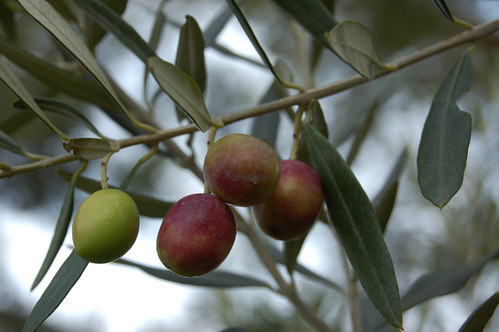
Anyone who has visited the South of France will remember the vineyards and olive groves. According to what we've been told, olives were brought to the Mediterranean regions by the Phoenicians eight hundred years before the birth of Christ. The particular area where my family lives has olive trees everywhere.
The interesting thing is that neither olives nor wine were the primary agricultural product for this region, historically. We were told that before the introduction of synthetic fabrics, Provence was a major silkworm cultivation center. You can still drive around and see stone buildings in the middle of fields, which were where the silkworms were raised and fed on mulberry leaves.
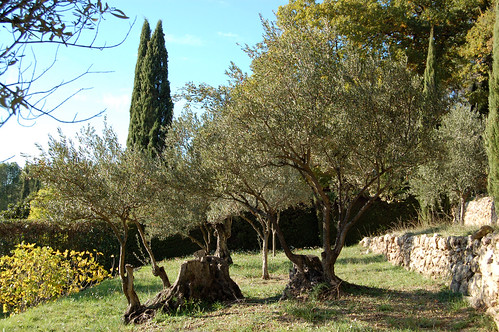
Olives supplanted silkworms as a major crop, until a massive frost in the mid-1950's decimated the olive trees. Farmers planted vineyards at this time, because it would take years to regrow their olive groves.
This photo is from our friend Mariucca's yard. You can see the original (massive) stump of the original tree, and the smaller trees have grown back since the frost. If those smaller trees are fifty years old, can you imagine how old that original tree must have been? There are countless olive groves with dozens upon dozens of trees, just like this. To maximize agricultural growing space, all the hills have been terraced, which brings more light to the trees, flattens out the hills into stair-steps, and used the ubiquitous rocks as retaining walls. These ancient terraces, built hundreds of years ago, are a truly lovely sight.
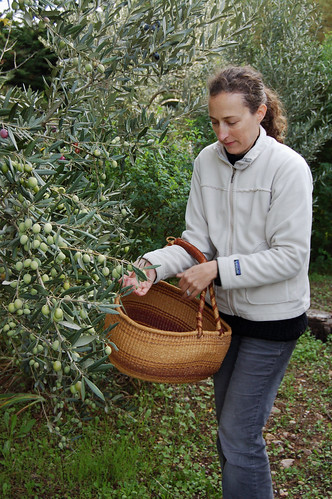
Everyone around here has a garden full of fruit trees. My family has figs, apricots, cherries and half a dozen olive trees. My sister and I harvested the olives, today. These olives will be combined with the harvest from several of Anne's friends, and will be taken to the community olive press, where they will be turned into olive oil. We picked our olives in a somewhat under-ripe state, because the friends' trees were ready to go, and Anne and dad needed to piggy-back on their pressing. There's a minimum that needs to be reached before they will press oil.
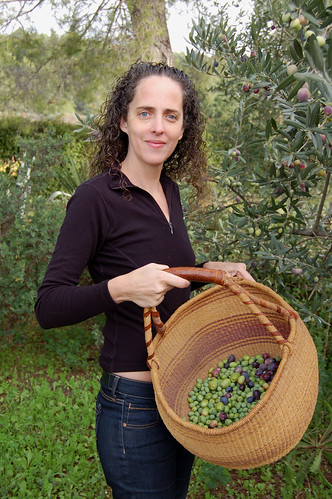
Can you see how distorted my hand is in this photograph? Olives are incredibly heavy!
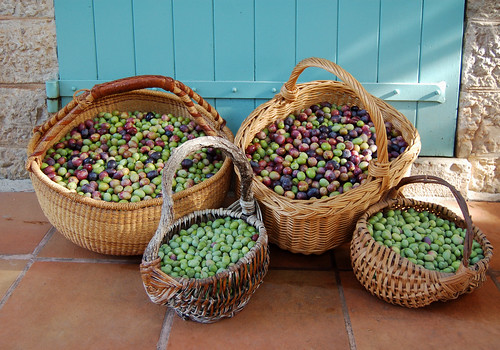
This is the bounty from the six small trees in the garden. I understand that this will produce about three or four bottles of oil.

Anyone who has visited the South of France will remember the vineyards and olive groves. According to what we've been told, olives were brought to the Mediterranean regions by the Phoenicians eight hundred years before the birth of Christ. The particular area where my family lives has olive trees everywhere.
The interesting thing is that neither olives nor wine were the primary agricultural product for this region, historically. We were told that before the introduction of synthetic fabrics, Provence was a major silkworm cultivation center. You can still drive around and see stone buildings in the middle of fields, which were where the silkworms were raised and fed on mulberry leaves.

Olives supplanted silkworms as a major crop, until a massive frost in the mid-1950's decimated the olive trees. Farmers planted vineyards at this time, because it would take years to regrow their olive groves.
This photo is from our friend Mariucca's yard. You can see the original (massive) stump of the original tree, and the smaller trees have grown back since the frost. If those smaller trees are fifty years old, can you imagine how old that original tree must have been? There are countless olive groves with dozens upon dozens of trees, just like this. To maximize agricultural growing space, all the hills have been terraced, which brings more light to the trees, flattens out the hills into stair-steps, and used the ubiquitous rocks as retaining walls. These ancient terraces, built hundreds of years ago, are a truly lovely sight.

Everyone around here has a garden full of fruit trees. My family has figs, apricots, cherries and half a dozen olive trees. My sister and I harvested the olives, today. These olives will be combined with the harvest from several of Anne's friends, and will be taken to the community olive press, where they will be turned into olive oil. We picked our olives in a somewhat under-ripe state, because the friends' trees were ready to go, and Anne and dad needed to piggy-back on their pressing. There's a minimum that needs to be reached before they will press oil.

Can you see how distorted my hand is in this photograph? Olives are incredibly heavy!

This is the bounty from the six small trees in the garden. I understand that this will produce about three or four bottles of oil.

Comments
well ya know the ancient Greek Gods ruled that Athena's gift to mankind, olives, was the most useful! Oil,food, wood, tree shade
and the legend of how the branch dipped into the salty sea, thus making the first curd (brined) oilves.
Love 'em so much I named my kid after 'em
SuziLivvi in SF
Annalisa
beautiful photos.